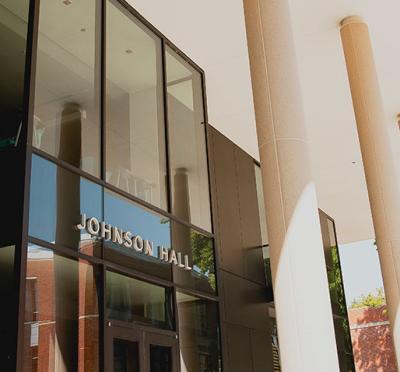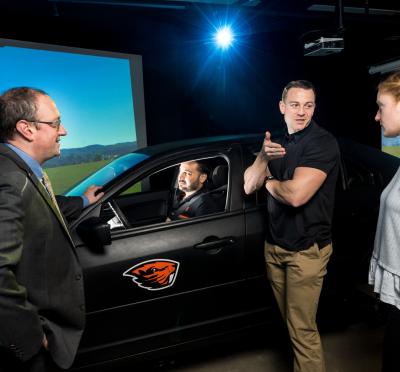You need a scorecard to keep track of Masoud Ghodrat Abadi’s accomplishments since he arrived at Oregon State in 2014 to start his doctoral work in transportation engineering. Topping his own list is the Eno Fellowship that he earned last spring, an honor bestowed on just 20 graduate students in the entire country annually by the Eno Center for Transportation. The Eno Center is the nation’s preeminent transportation policy and professional development organization.
As a fellow, Abadi merited a place at the organization’s five-day Future Leaders Development Conference in Washington, D.C., last June, where he met federal officials and business leaders. During a visit to Capitol Hill, he sat down with two former secretaries of transportation.
“The fellowship was the biggest achievement in my academic life,” Abadi said. “It was exciting to meet the people who created the Transportation Security Administration.”
Earlier this year, Abadi won the 2017 Pacific NW Transportation Consortium (PacTrans) Michael Kyte Award, which recognizes technical merit and research, academic performance, professionalism, and leadership. He also took first place in the 2016 PacTrans Public Service Announcement Competition for his work to discourage distracted driving. And in 2015, he took home the prestigious Bill Kloos Scholarship, for which applicants are judged on their ability to increase awareness of key transportation issues using fresh approaches to communication.
Abadi’s answer was an engaging board game, Busy Beavers!, where players compete to cross the U.S. as quickly and efficiently as possible.
His research focus at Oregon State includes traffic control and operations (including research funded by the Oregon Department of Transportation to study automated, real-time adjustments to red-light timing designed to prevent collisions); engineering education to correct misconceptions about traffic and transportation; and bicyclist behavior and safety, which is his dissertation topic. He is currently evaluating bicyclist behavior in dense urban areas using Oregon State’s bicycling simulators, one of only several in the world.
“I want to increase bicyclists’ safety and comfort levels, particularly when confronted with truck traffic,” Abadi said.
Abadi grew up as the youngest of three children in Rey, Iran, a township on the southern edge of the Tehran metropolis. When he was 10 years old, his sister, Maryam, who is 16 years his senior, sometimes took him along to the high school Persian literature class she taught. She even allowed him to grade some of their assignments and exams.
“I saw how happy she was teaching. That motivated me to continue my education and it triggered something in me,” Abadi said. “I knew even then that I wanted to become a teacher.”
High test scores earned Abadi spots in top-tier middle and high schools. High grades and a strong showing on the national university entrance exam (750th out of 360,000 students) allowed him to attend one of the country’s top technical schools, Amirkabir University of Technology, where he received his B.Sc. in Civil Engineering in 2010. Next came his M.Sc. in transportation engineering in 2012 from Sharif University of Technology. While studying for his master’s degree, he got married and worked as a traffic engineer.
“In Iran, education is free, but graduate students don’t receive stipends, so I had to work during school to support my family.”
At the end of August, Abadi took his Ph.D. preliminary exam. He anticipates defending his dissertation in winter 2018. After that, he has set his sights on a faculty position.
“I love teaching and I love research,” Abadi said. “I grew up in an atmosphere where learning was very important, and I think of academia as my home.”



